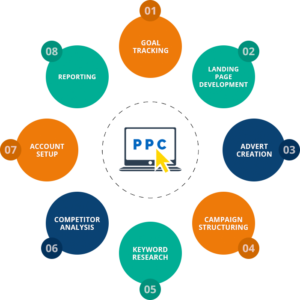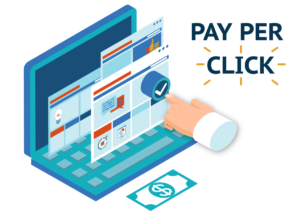PPC is a type of internet advertising that helps you get more visitors to your website. The platform or website delivering your advertising charges you a fee each time a user clicks on your ad. As a result, the term “pay-per-click” was coined. Because PPC allows you to purchase visits to your website, it usually works faster than naturally gaining those hits.
Paid advertising is an all-around appealing alternative for businesses since it is a rapid approach to raise brand recognition, create leads, and enhance conversions.

Ad Copywriting Dexterity: If you want to succeed in PPC, you must convince people to click on your advertisements. This implies you should be comfortable crafting calls to action and prepared to change them if they don’t work. Knowing how to work with keywords, connect with your audience, and ensure your ad corresponds with the landing page are all important aspects of developing ad copywriting abilities.
AdWords Experience – Without a question, Google AdWords is the most used paid advertising platform on the planet. If you want to work as a PPC professional, you must be familiar with AdWords. You’ll need to know how to find the best keywords, how Google decides when to show your ad, how to put bids, and how to set up and manage campaigns and ad groups to become proficient with this platform.
User Experience Understanding – If you don’t comprehend your consumers’ actions, you won’t be able to build advertising that entice them to click. Consider if your advertising are intended to raise brand recognition, create leads, or drive conversions, and tailor your material to meet those objectives.
Targeted ads is a rapidly world where you must be flexible and successful to stay ahead of the curve. PPC professionals should concentrate on honing these talents as the cornerstone for a professional future in online advertising. Click this link to hire best ppc specialist.
In the last several years, the sponsored search environment has altered dramatically. It has evolved into a sophisticated ecology with:
- a plethora of channels
- Seasonality, many devices, and locales.
- Increased competition across the board, including brand, generic, and shopping activity.
- Automate bid management with complex bidding rules and bid modifiers.
- Remarketing methods that are laser-focused on a certain audience.
- Absurdly large volumes of data for strategy and planning.
With so much to think about, it’s critical to figure out what steps to do in the midst of managing a PPC account.
If you want to get the most out of your sponsored search ads, here are seven things to keep in mind.
- Synchronizations of data
Any marketing team has to be able to integrate data. There’s a simple solution to combine your analytics and search data in one platform.
Even if you only use the free version, Google Analytics is a crucial tool for marketers since it helps you to make better educated decisions about your PPC spend. You’ll need administrator access to a Google Ads account as well as modify authorization to a Google Analytics account to link the two.
You’ll be able to view a lot of metrics that you couldn’t view previously once the two platforms are linked. You may use this information to determine which keywords are most effective for increasing site interaction and adjust accordingly depending on your KPIs.
You want more users to spend more time on your site and visit more pages if you’re launching a branding campaign. If you’re conducting a direct response campaign, you want more visitors to interact with certain goals on your website and, perhaps, convert.
You may also start developing audiences based on people’s on-site activity using an analytics integration, which is really useful.
- Documentation about the target audience
Paid search is based on keyword intent, which means it always targets individuals based on what they’re looking for. It’s been this way since the beginning.
However, with various channels, devices, places, seasonality, increased competition, and more data than ever before, today’s climate is extremely hectic.
- Effectiveness of Generic Keywords
Because generic keywords are so costly, it’s critical to use them correctly.
Generics are employed more for research and are higher in the funnel. Generic term conversion rates are often low, and significantly lower than brand term conversion rates.
It’s a waste of time to use a last-click conversion approach to achieve business objectives.

Generics: How to Use Them Correctly
You may utilize generics as a refocusing tool, focusing on people in your customer lists who search for generic phrases after visiting your site.
They’ve previously interacted with you, therefore they’re already familiar with your brand. As a result, when they broaden their search, keep your brand in front of their minds and entice them to switch again, either by:
- Distinctive messaging (i.e., put an offer into the ad copy).
- Or by boosting your audience bids so that you show up higher on generic words at a moment when individuals are most inclined to convert.
- Account Architecture That Works
Your account structure is the basis of your account and determines how effectively it runs. A wide framework will result in wasted impressions.
In the near term, a granular account structure may take longer to set up, but it will provide you with more accurate data and bid management skills in the long run.
- Landing Page Mastery
The landing page that a visitor arrives at after clicking on your ad is just as crucial as the ad itself. Simply, the content of your landing page should be a logical extension of your ad copy. It’s crucial not just for your own marketing objectives, but it may also affect how frequently your adverts are viewed.
- Creative potential
Your advertisements will require visual assets regardless of whatever PPC advertising network you employ (AdWords, Facebook, Instagram, etc.). That’s why it’s critical that you understand each platform’s design needs and which tools can help you generate the greatest images. After all, a graphic designer may not always be available, therefore you’ll want to be able to rely on your own abilities!
- Knowledge of Statistics on the Job
If you want to work in sponsored advertising, you must be able to decipher the data that comes with it. Every ad you run will have its own set of impressions, clicks, CTRs, conversions, and other metrics. As a PPC marketer, you must be able to examine these figures quickly and utilise the information to make judgments about your advertising. click the above link to hire the best PPC specialist.